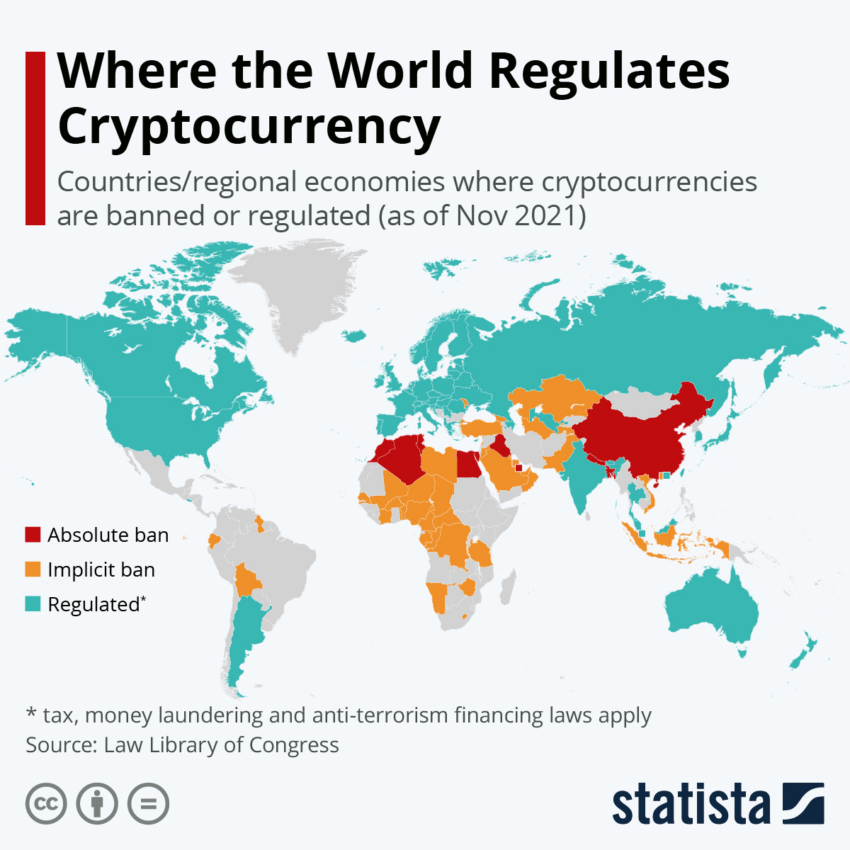Web3 founders face unprecedented challenges, especially in light of the recent US crypto crackdown. The $4 billion settlement with Binance and legal actions against its CEO highlight the intensified regulatory scrutiny in the cryptocurrency market.
This crackdown reflects the necessity for Web3 startups to adapt their strategies to navigate the regulatory environment effectively.
Regulation Boosts Investors’ Confidence
The US regulatory environment for cryptocurrencies has become increasingly stringent. Regulatory bodies emphasize compliance with financial regulations, anti-money laundering (AML) standards, and customer protection mechanisms.
“The $4 billion settlement with Binance, along with the legal actions against its CEO, represents a significant moment for the global cryptocurrency market,” Maria Fiorentini, co-founder at Mujeres en Derecho, told BeInCrypto.
This heightened scrutiny necessitates that Web3 founders implement robust crypto compliance frameworks to align with regulatory expectations. Indeed, investor confidence plays a critical role in the success of Web3 startups.
Regulatory actions against major players like Binance, Coinbase, and Kraken have shaken investor confidence due to the highlighted risks and uncertainties within the cryptocurrency market. However, in the long term, stringent regulations could clean up the industry, thereby bolstering investor trust.
“The impact on investor confidence can be seen from two angles… These actions could either bolster investor confidence by cleaning up the industry or discourage them due to strict regulations,” Fiorentini noted.
Web3 founders should focus on transparency and compliance to reassure investors and attract long-term investments.
Therefore, to navigate the regulatory environment, Web3 startups must implement robust AML and Know Your Customer (KYC) programs. Effective KYC procedures involve verifying customer identities, conducting background checks, and ensuring compliance with international sanctions lists.
Read more: Crypto Regulation: What Are the Benefits and Drawbacks?
Enhanced due diligence is essential for high-risk customers, including those engaging in large transactions or operating from high-risk jurisdictions. According to Fiorentini, Web3 founders can mitigate risks by establishing these programs and demonstrating their commitment to regulatory compliance.
A Comprehensive Compliance Framework
Fiorentini believes that a comprehensive compliance framework is vital for Web3 startups. This includes establishing a dedicated regulatory compliance team responsible for understanding, implementing, and updating the company’s practices in line with current laws and regulations.
Regular internal and external audits of compliance programs can help identify vulnerabilities and ensure adherence to regulatory requirements.
Advanced monitoring and reporting systems are also crucial for detecting and preventing suspicious activities. Indeed, real-time transaction monitoring technologies can identify large transactions, rapid movements of assets, or patterns indicative of money laundering.
Procedures for promptly reporting suspicious activities to relevant authorities are also relevant. These include developing clear processes for identifying, reviewing, and filing Suspicious Activity Reports (SARs), which are essential for maintaining regulatory compliance.
For Web3 startups operating internationally, compliance with regulatory standards across all jurisdictions is imperative. This includes adhering to the Financial Action Task Force (FATF) recommendations and other international guidelines. By ensuring global compliance, Web3 founders can mitigate risks associated with cross-border operations and build a robust foundation for sustainable growth.
“There are more requirements depending on which country the exchange is operating. These are just general things that need to be done. I would advise having a strong legal team that truly understands how crypto works and that investigates in depth its regulation according to each country,” Fiorentini told BeInCrypto.
Read more: How Does Regulation Impact Crypto Marketing? A Complete Guide

Collaborative efforts with regulatory bodies can significantly enhance the compliance capabilities of Web3 startups. Global cooperation among regulatory and enforcement agencies is essential for combating cross-border crypto scams and tracking down perpetrators.
Encouraging the development of industry standards and best practices for transparency, security, and customer protection can also foster a more secure and reliable cryptocurrency market.
Emphasizing Education and Awareness
Education and awareness campaigns are crucial for protecting investors and maintaining market integrity. These campaigns should inform investors about the risks of cryptocurrency investments, how to spot scams and the importance of due diligence.
Establishing easy-to-use reporting mechanisms for suspected frauds and scams can ensure swift action and protect investor interests.
“Educational campaigns and reporting mechanisms are essential… Investors need to understand the risks and how to navigate them,” Fiorentini emphasized.
The regulatory environment for cryptocurrencies is evolving, with a trend toward greater clarity, stricter compliance, enhanced consumer protection, and international coordination. Although challenging for some market participants, these regulatory adjustments are crucial for the long-term sustainability and legitimacy of the cryptocurrency industry.
“While the details and pace of these changes will vary across jurisdictions, the overall direction indicates a maturing market that is increasingly integrated into the global financial system,” Fiorentini concluded.
In conclusion, Web3 founders must adopt comprehensive strategies to effectively navigate the US crypto crackdown. By implementing robust compliance frameworks, building investor confidence, and ensuring international compliance, Web3 startups can thrive and contribute to the maturation of the global cryptocurrency market.
Trusted
Disclaimer
Following the Trust Project guidelines, this feature article presents opinions and perspectives from industry experts or individuals. BeInCrypto is dedicated to transparent reporting, but the views expressed in this article do not necessarily reflect those of BeInCrypto or its staff. Readers should verify information independently and consult with a professional before making decisions based on this content. Please note that our Terms and Conditions, Privacy Policy, and Disclaimers have been updated.

